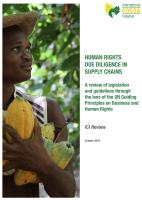This ICI review analyses current due diligence and transparency legislation through the lens of the UN Guiding Principles for Business and Human Rights (UNGPs).
In today’s fast-moving regulatory environment, this report seeks to support businesses to define and refine their human rights due-diligence strategies by providing a practical overview of current and upcoming legislation and guidance.
This report finds that there are considerable differences between existing due diligence legislation at the national level. Many laws do not fully meet the ambitions or standards set out in the UN Guiding Principles. Currently, most legislation primarily focuses on external communication and disclosure, with little emphasis on action. The themes of ‘tracking’ and ‘remediation’ from the UN Guiding Principles are commonly neglected. They receive no mention at all in the majority of existing laws. A notable exception is the French Duty of Vigilance law, which goes further in its measures than any other law, consistently aligning itself with the UN Guiding Principles.
Until regional laws, such as those under consideration for the EU, come into force, most businesses will be faced with a choice. Either they comply with a higher, nonbinding, single set of systems and procedures to align themselves with the UN Guiding Principles, or they do the minimum needed to comply with the various obligations of overlapping domestic legislation. For large international businesses operating across different countries, alignment with the UN Guiding Principles may be the more practicable approach.
